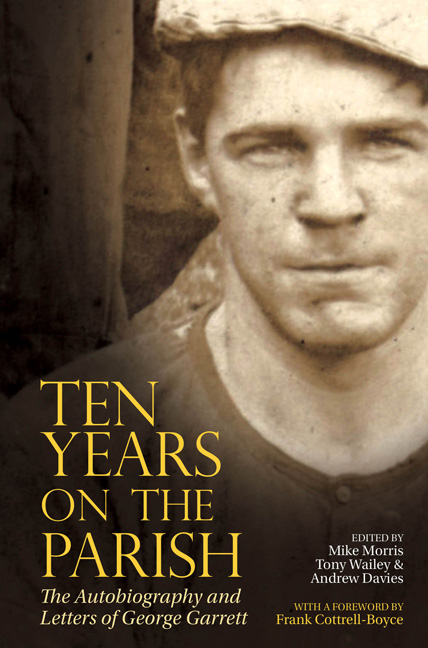Book contents
- Frontmatter
- Contents
- List of Illustrations
- Acknowledgements
- Foreword
- Frontispiece
- Introduction to Ten Years On The Parish
- Notes on the Text
- Autobiography from Ten Years On The Parish
- Ten Years On The Parish
- Dear Garrett: An introduction to the Garrett–Lehmann Letters
- Letters between George Garrett and John Lehmann
- Additional information
- Index
- Miscellaneous Frontmatter
Introduction to Ten Years On The Parish
- Frontmatter
- Contents
- List of Illustrations
- Acknowledgements
- Foreword
- Frontispiece
- Introduction to Ten Years On The Parish
- Notes on the Text
- Autobiography from Ten Years On The Parish
- Ten Years On The Parish
- Dear Garrett: An introduction to the Garrett–Lehmann Letters
- Letters between George Garrett and John Lehmann
- Additional information
- Index
- Miscellaneous Frontmatter
Summary
George Garrett (1896–1966), merchant seaman, writer, playwright and founder member of Liverpool's Unity Theatre, was a radical activist and a ‘militant advocate of tolerance’ who travelled the world and wrote a series of short stories, plays, documentary reports and reportage about unemployment, poverty and struggle in the 1920s and ’30s. Garrett occupies a unique and significant position as the central point of a compass that links Liverpool to an international literary, cultural, social, political, theatrical and sea-going history.
Ten Years On The Parish, Garrett's autobiographical work covering the period 1926 to 1936 and written between 1936 and 1938, is published here for the first time complete. It is one of the most remarkable documentary pieces of writing written by a working-class writer, detailing poverty, unemployment and methods of resistance in Liverpool and the UK. That it was never published in Garrett's lifetime is a tragedy, the reasons for which are explored in detail later in this introduction and documented in the letters between Garrett and his editor, the poet and publisher, John Lehmann. It is a tragedy as its publication in the 1930s would no doubt have brought Garrett the respect and profile amongst his peers and the literary establishment he both craved and deserved, and one that prevented a generation from reading a milestone document that bore witness to their harsh lives and offered possibilities for resistance. We are proud (now) to be able to rectify this omission, while pointing out that Ten Years On The Parish represents just one aspect of Garrett's varied creative output – plays, short stories, reportage, critical essays, and more – which here we can only touch upon.
This introduction will place Ten Years On The Parish in the context of the times and the places Garrett lived and wrote within, but it will also explore the aspects of Garrett's life which are not detailed in the manuscript for a variety of reasons, including the desire from publishers in the 1930s to have working class writers only detail their experiences of unemployment, but which nevertheless had a major influence on him and the events he describes. This particularly means examining the time he spent in America in the 1920s.
- Type
- Chapter
- Information
- Ten Years on the ParishThe Autobiography and Letters of George Garrett, pp. 1 - 33Publisher: Liverpool University PressPrint publication year: 2017

